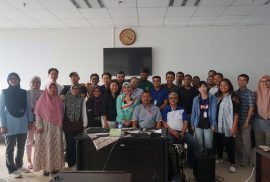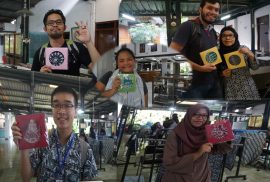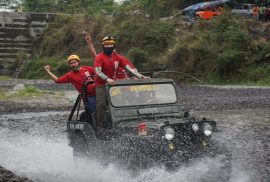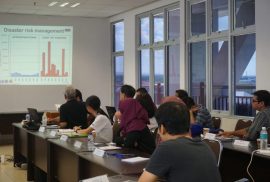The Faculty of Geography at Universitas Gadjah Mada (UGM) is organizing a Summer Course on Ecosystem-based Disaster Risk Reduction and Climate Change Adaptation (Eco-DRR & CCA) from August 21st to 26th, 2023. The course will be conducted in a hybrid format at the Faculty of Geography. The Summer Course Eco-DRR & CCA Opening Ceremony was held, attended by 23 participants and 10 resource persons from 5 countries. The opening remarks were delivered by the Program Coordinator, Dr. Dyah Rahmawati Hizbaron, M.T., M.Sc, The Vice Dean for Research, Cooperation and Alumni, Faculty of Geography, UGM followed by comments from representatives of the Southeast Asian Regional Center for Graduate Study and Research in Agriculture (SEARCA) Office.
Monday, 30th July 2018
1. Junun Sartohadi – Ecosystem Based DRR through geo-pedological approach at the volcanic transitional landscapes
2. Sunil Kumar De – Disaster risk Management in the Tropics: Geomorphological Perspective
Wednesday, 1st August 2018
1. Tsung-Yi Lin – Shoreline Changes and the Consequences of Climate Change
Thursday, 2nd August 2018
1. Estuning Tyas Wulan Mei – Crisis Management during Volcanic Eruption
Friday. 3rd August 2018
1. Zulfa Hanan Ash’aari – Better Air Quality In Asia: Regional Action, Global Impact
2. Decibel V. Faustino-Eslava – Geohazards, tropical cyclones and disaster risk management in the Philippines: Adaptation in a changing climate regime
By
Jose Limbay Lahi O. Espaldon (University of the Philippines Los Banos, Philippines)
Divina Gracia Baclig (CARE Philippines)
Kapil Ghosh (University of Calcutta, India)
Universitas Gahdja Mada, Yogyakarta Indonesia — In a world full of uncertainties and inevitable conditions, there are different ways on which we can contribute to positive development and growth. As the old adage goes, the only constant thing in the world is change. The Earth is continually being shaped by natural processes. Natural forces, such as geologic and geomorphological processes, transform the topography of the Earth, thereby affecting the way of life of people. Due to these changes, society is also being transformed. The lectures by Dr. Rohayu Che Omar, Dr. Franck Lavigne, and Dr. Mohd Hairy Ibrahim emphasize this.
By
Divina Gracia Baclig (CARE Philippines)
Siti Mahfuzah binti Mardy (Universiti Teknologi Malaysia)
Pan, yen-wei (National Taiwan Normal University)
Jose Limbay Lahi O. Espaldon (University of the Philippines Los Banos, Philippines)
David Alejandro Urueña Ramirez (Universidad Nacional de Colombia Sede Medellín)
I was especially excited to go to the Batik Museum. We arrived at the Batik Winotosastro Center at around nine in the morning. I was a bit surprised by the size of the space. I was expecting a factory-type set-up, given that batik is a popular Indonesian souvenir. I thought that they were mass producing the product. I realized how the center took pride in being true to the traditional process of creating batik by making sure that all processes are handmade.

By
Chris J. Tapnio (Philippine Rural Development Project )
Ma. Charisma T. Malenab (University of the Philippines Los Banos, Philippines)
Sayantan Das (Dum Dum Motijheel College, Kolkata, India)
Jun, Yamaguchi (University of Tokyo, Japan)
How would you feel if you were standing just several kilometers away from the one the most active volcanoes on Earth? Perhaps this was the recurring question in the minds of all the participants of the 2018 Summer Course in Ecosystem-based Disaster Risk Reduction as we rode on a bus and traveled near the foot of Mount Merapi.

By
CHRIS J. TAPNIO
Philippine Rural Development Project
During the last day of the week, the summer course on Ecosystem-based Disaster Risk Reduction continued with two very special lecturers known for their expertise in their respective fields.
The first speaker, from the University of the Philippines in Los Banos, Dr. Decibel Faustino-Eslava presented her lecture entitled “Geo hazards, tropical cyclones and disaster risk management in the Philippines: Adaptation in a changing climate regime.” Coming from one of the countries most vulnerable to climate change, she presented the profile of the Philippines in terms of weather extremes as well as geo hazards.





